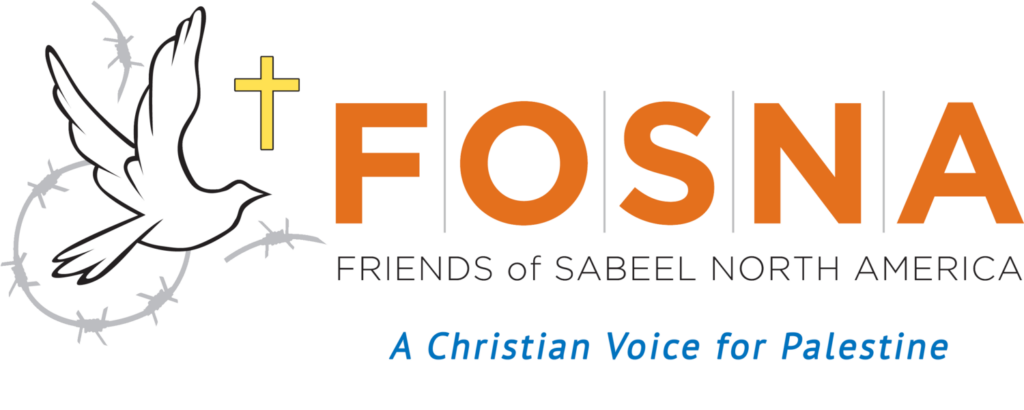
| I was naked and you clothed me, I was sick and you visited me, I was in prison and you came to me.’ Then the righteous will answer him, saying, ‘Lord, when did we see you hungry and feed you, or thirsty and give you drink? And when did we see you a stranger and welcome you, or naked and clothe you? And when did we see you sick or in prison and visit you?’ And the King will answer them, ‘Truly, I say to you, as you did it to one of the least of these my brothers or sisters, you did it to me.’ —Mathew 25:36-40 One of the most crucial issues touching every single Palestinian household is that of prisoners. Prior to the events of October 7, there were over 5,000 Palestinians in Israeli prisons. 1,300 of them were administrative detainees (individuals picked up and held indefinitely without charge or trial). Today, after less than a month, the figure is reportedly close to 10,000 prisoners, including women and children. It is estimated that almost one million Palestinians have been detained or jailed at one time or another. Some prisoners have been in jail since even before the Oslo Process but somehow were not released when the PLO and Israel came to an agreement and created the Palestinian Authority. Back in 1989, Rev. Naim Ateek and I, together with Palestinian lawyers and doctors, most of them Moslems in the West Bank, started an organization named the Mandela Institute for Political Prisoners. For Rev. Naim and myself, our motivation came directly out of Christ’s commandment listed above, even though the Mandela Institute is itself a secular institution. Although Rev. Naim and I no longer serve on the institute’s board, we are very pleased that it continues to serve Palestinian prisoners, particularly through attorney visits. When the events of October 7 went down, it was immediately clear that the reason Hamas abducted Israelis was specifically to trade them for Palestinian prisoners. Little or no attention, however, was given in the media to this central aspect of the equation. There was much coverage of the civilian hostages and the agony of their family members at not knowing their fate. We share in that concern, and we see Christ himself in each of these hostages and their families who are in agony, just as we see him in each Palestinian prisoner. Ultimately, taking civilians as hostages is illegal under international law and is to be condemned in no uncertain terms. Those of you who have been following the case of Shadi Khoury, the teenage grandson of Sabeel co-founder Samia Khoury, also know the agony and terror of Palestinian families whose children, brothers, parents, or friends are also yanked out of their beds and homes, often at gunpoint in the middle of the night by masked commandos, or who are swept up in the streets and taken to Israeli jails on trumped up charges. Those who have been following our campaign regarding imprisoned World Vision staffer Mohammad Halabi also know that even those who are convicted in Israeli courts are most likely political prisoners, not criminals or terrorists convicted in a proper court of law. While we believe civilian hostages should be released immediately and without condition, the call for Palestinian prisoners to be released in a prisoner exchange with those soldiers captured on October 7 is therefore a very reasonable demand. The families of the Israeli hostages have made public statements supporting such negotiations. Unfortunately, the Israeli government and military, feeling humiliated by their unpreparedness for the Hamas attacks, seem willing to risk or sacrifice the lives of all the captives in their headlong campaign to reestablish “deterrence” and exact heavy retribution upon the people of Gaza in a campaign of vengeance. Doing “whatever is necessary” to bring the hostages home should include, as an immediate priority, engaging in negotiations with Hamas to effect a prisoner exchange as quickly as possible. Meanwhile, the massive bombing of Gaza is leading to vicious massacres of mostly innocent civilians. As of this writing, over nine thousand Palestinians have been killed, of whom 3,718 are children, and another 1,929 are women. On Tuesday, Israelis bombed a highly packed residential building in the heart of the immensely crowded Jabalia Refugee Camp, killing and wounding hundreds. Israeli spokespersons, lacking any proof whatsoever, claimed that a high-ranking Hamas commander was the intended target. Later, they also claimed, again without proof, that 50 Hamas fighters were killed in that attack. Our hearts are heavy with the weight of these deaths. We raise our voices in calling for Ceasefire Now! We are ashamed and appalled that the United States vetoed a resolution calling for a ceasefire and that individuals who even call for such a ceasefire would be viewed as enemies and face persecution. Professor Nadera Shalhoub-Kevorkian, an internationally renowned Professor at the Hebrew University, was ordered by the President of the University to resign for signing a letter calling for a ceasefire. FOSNA has launched a campaign to get the University to reconsider. The continued fighting is not likely to help bring an end to the suffering or rescue the hostages. We need to pray and work for an immediate ceasefire, so that the real task of working for a just peace can begin. |
